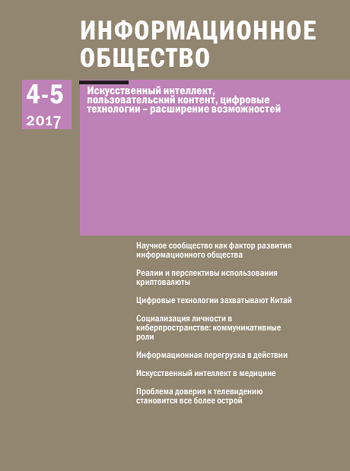|
 The
heading “Social and economic aspects of the Information Society” is opened by
the article of the candidate of the economic sciences Pavel Opolev “Social Complication: Trends and Prospects”. Further
in the article by Alexey Degtyarev
the problem of “working in the Cloud” is discussed and innovative forms of
employment based on ICTs. The author asserts that creation of innovative highly
intelligent jobs allows substantially increasing productivity without increase
of the unemployment level. The candidate of the economic sciences Irina Novikova suggests a new
methodology for identifying the information potential for employment of
population. The
heading “Social and economic aspects of the Information Society” is opened by
the article of the candidate of the economic sciences Pavel Opolev “Social Complication: Trends and Prospects”. Further
in the article by Alexey Degtyarev
the problem of “working in the Cloud” is discussed and innovative forms of
employment based on ICTs. The author asserts that creation of innovative highly
intelligent jobs allows substantially increasing productivity without increase
of the unemployment level. The candidate of the economic sciences Irina Novikova suggests a new
methodology for identifying the information potential for employment of
population.
Under
a new heading “Digital Economy” there is an article prepared by the group of
authors: Vladimir Bauer, Vladimir
Vorozhikhin , Alexander Raikov and Vladimir
Smirnov “Will the Crypto-currency Be Able to Ensure Development of the Digital Economy in Russia?”. The article examines the
relationship of crypto-currency with the basic crypto-currency such as bitcoin
and the processes of investing in innovations through the ICO mechanism with
the use of crypto-currencies. The main risks of traditional business and
business, based on the use of blockchain, crypto-currencies and tokens, are
compared. The authors agree that the crypto-currency has a unique business
potential that allows ensuring of the digital economy development in Russia.
For the first time on the pages of the journal the review of the Chinese
economy is presented. In his article candidate of political sciences Nikolai Revenko reviewed main trends of
China's digital economy, revealed the essence and tasks of the so-called
"Internet +" action plan.
In the next article the candidate of philosophical sciences Anton Zhelnin examines the problems of
the information crisis, the stressful aspects influencing on the person and his
psyche. The author of the article proves that information stress due to its systemic
action can cause not only such psychological phenomena as neuroticism and
depression, but also through a cascade of failures in the body's regulating
systems lead to emergence of various somatic pathologies.
The article by candidate of sociological sciences Tatyana Bocharova "Information and Communicative Behavior of Users within Web-communities" author's classification of communicative
roles of web-communities’ members is presented. The topicality of the issues related
to the study of socialization of an individual in cyberspace is proved. The
research implemented by candidate of cultural studies Varvara Chumakova and presented in her article “Perceptions of Modern
Russian Students of Information Overload in Social Media” is based on data
obtained in the course of in-depth interviews with Russian students. The goal
is to study their perception and ideas about information overload, including
the association of information overload and permanent staying on-line.
Further
in the heading “Information Society and State Power”, Alyona Nefedova,
Junior Researcher of the Higher School of Economics, in her article attempts to
assess how the idea of e-government being implemented in Russia ensures
effective interaction of Russian citizens with state authorities at different
levels
The real gem of this issue is an article by Alexander Gusev and Sergei
Dobridnyuk “Artificial Intelligence in Medicine and Healthcare” describing
the history of the artificial intelligence development and analyzing the technology of machine learning
and neural networks. The review of already implemented artificial intelligence
projects along with a forecast of the most promising directions of the
artificial intelligence technologies development for the near future is given.
The
article by Sergey Shaposhnik
“Scientific Community as a Factor of the Information Society Development
in Russian Regions” presents the outcome of an empirical study of the
scientific community role in development of the Internet and the Information
Society in the regions of Russia. A high level of correlation between the use
of the Internet and the share of researchers among the population of the
Russian regions is explained by the fact that the scientific community acted as
a leader in development and dissemination of computer network technology in the
regions of Russia.
In
her article, Olga Molchanova, from Saint-Petersburg State University of Economics,
devoted to the analyzes of user content, particular as a factor of modern mass
media development. Both the advantages of utilizing user content by mass media
and the threat generated by this trend are analyzed.
In
the heading “Information Society and Mass Media” the article by Candidate of
Sociological Sciences Alexander Efanov
“Tendentiousness of Covering Political Scandals and Problem of Trust in
Television”, compares the strategies for covering the political scandal with
the program policy of broadcasting of regional TV channels. The author
concludes that the extent of trust of the audience in television has changed.
And
finally, in our traditional heading “Technologies of the Information Society”
there is the article by Polad Geidarov,
Candidate of Technical Sciences from Azerbaijan “Prospects for Creation of a
Mobile Video Monitoring State System". In the article the prospects for
creation of such a system, including technical, organizational, financial and
legislative prerequisites, as well as the advantages of use of the unified
mobile video monitoring system in various public administration spheres are
discussed. The second article in this column by Gramudin Abdulgalimov and Sergei
Mikerov is devoted to the design, creation and implementation of electronic
terminals for the selection of goods in electronics stores. A concrete example
of development of the interactive terminal for automotive acoustics” Pioneer” implemented in “M.Video” supermarket is
described. |

